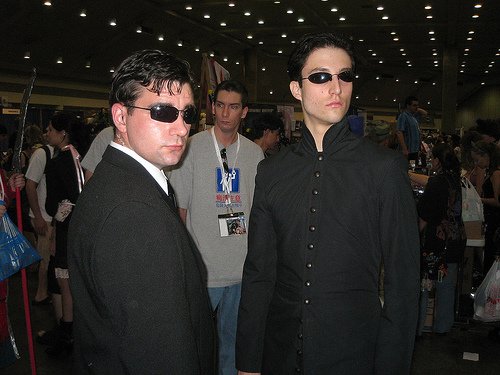My son and I continue to enjoy our mini-vacation here in Baltimore, and it’s been fun to watch his reactions to various things here. We went swimming the other day to try and get away from the heat (ha!), and one of his observations was that America is more “free” than Japan — fewer rules to follow resulting in more fun, from his 11-year-old point of view. When you go swimming in Japan, there are plenty of rules to follow — everyone must wear a swimming cap and must shower for 2-3 minutes before going in, no one may dive or even jump in from the poolside for any reason, parents must keep within an arm’s reach of children until they’re a certain height no matter how well they can swim, and of course kids may not horse around by seeing how high they can jump off Dad’s shoulders into the pool. But we had a great time swimming here, and even tried our hand at the high dive, a very rare thing in Japan, a country where all the pools contain uniformly shallow water for maximum safety for swimmers. (Another random observation my son made to me: if Burger King married Dairy Queen, would their child would be Jack in the Box?)
The idea that America is more “free” than Japan is one I’ve encountered quite often during my ESL teaching days. Japanese students, tired of Japan’s stricter, more structured society, often pine for life in America, which is “free” and therefore good. In what way is America freer than Japan, I would ask, always eager to teach a lesson on a subject that interests my students rather than working from an ESL text. In America, there are fewer rules and more personal freedom, the answer would come back. No uniforms in junior high and high school. Most Americans start driving at age 16, not 18 as in Japan, and young people don’t have to pony up $3000 or more for a month-long driving school to get their license. In American there’s less pressure to fit into neat little holes the society has prepared for you. No doubt the image of America being “free” was helped along by Harley Davidson slogans and Jack Daniels marketing campaigns, so it’s hard to tell which perceptions are real and which are imagined, but it was always interesting debating what “freedom” meant to to the Japanese.
A “yankee” can be many things. To someone from the American South, the word refers to someone from the North, or maybe any American not from the South — is that a hint of Japan-style in-group/out-group labeling I detect? If you’re traveling abroad, you’re a “yank” even if you hail from Alabama or Georgia. But in Japan, the word yankee (perhaps more accurately written yankii to keep the concepts separate) refers to a “bad kid,” a street punk like the biker gang in the anime film Akira. Also called furyo” (lit. “not good) or boso-zoku (meaning “violent tribe”), the term yankii no doubt comes from the penchant these misguided youths have for dying their hair blonde, or at least orange-blonde, which is what color it usually ends up as. It’s considered quite normal for a Japanese young man to go through a phase where he rebels against society, and this is sometimes expressed as dressing tough and acting like he came out of a 1950’s drive-in flick. It’s embarrassing to say it, but the whole yankii thing can be traced sociologically to James Dean’s famous film Rebel Without a Cause, just as the seed for all “magical girl” anime from Minky Momo to Sailor Moon can be traced to the popularity of Bewitched when it showed on Japanese TV. It’s funny how everything in the world influences everything else…no country is an island, not even an island like Japan.
This month’s “Game of the Month” is Target: Pheromone, a wacky 2-disc release from G-Collections. Silk is a witch who needs to return to her own dimension, and she needs your help. You must collect female pheromones for her to make her magic work, and to do this she puts all the women around you under your spell. Can you help Silk get home? A great game from Japanese publisher Trabulance. Special pricing on this outstanding game, this month only!















